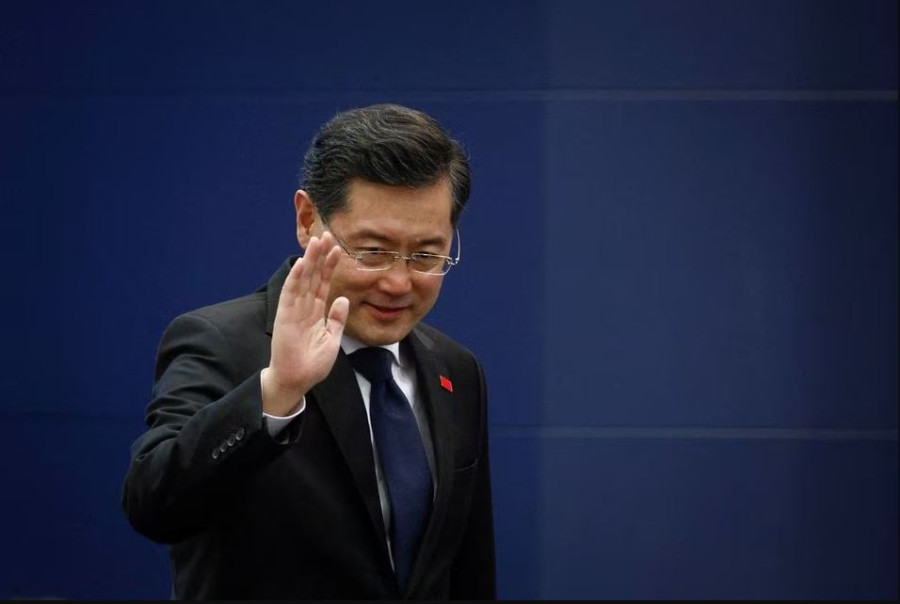Politics
Beijing’s Nepal policy will see more continuity than change: Chinese experts
Xi Jinping, after being elected for an unprecedented third term, has appointed Qin Gang as China’s foreign minister.
Purushottam Poudel
Qin Gang, the new foreign minister of China, is likely to give continuity to Beijing’s old policy towards Nepal, foreign policy experts say.
On March 7, Qin, 56, addressed the international media for the first time since taking office as foreign minister. On the margins of the annual session of the Chinese parliament in Beijing, Qin told journalists quoting Confucius: “One should repay kindness with kindness, and resentment with justice. If resentment is repaid with kindness, with what then should one repay kindness?”
“In China’s diplomacy, there is no shortage of goodwill and kindness.”
Nepal is closely watching China as Xi Jinping starts his third term as the country’s president and a new foreign minister joins office.
During Xi's first term, relations between the two countries were comparably smooth. China helped Nepal during the 2015 earthquakes and the subsequent economic blockade by India when Kathmandu did not heed New Delhi’s call to delay the new constitution.
Towards the end of Xi’s first term, Nepal and China signed the Belt and Road Initiative (BRI) in 2017, formerly known as ‘One Belt, One Road’ (OBOR). China’s diplomatic presence in Nepal dramatically grew during Xi’s second term. It is widely believed that China played a role in the 2018 merger of the CPN-UML and CPN (Maoist Centre). President Xi also visited Nepal in his second term in 2019. Prior to his visit, the Nepal Communist Party (NPC)—which later split in 2021 into three different parties—and the Chinese Communist Party (CPC) had signed a six-point agreement on various issues.
Nepal became a point of contention between the US and China when Washington’s Millennium Challenge Corporation (MCC) compact was being fiercely debated before its parliamentary approval last year.
China says it supports Nepal in safeguarding its sovereignty and national dignity, exploring a development path suited to its national conditions and pursuing independent domestic and foreign policies. In response, Nepal has been a staunch supporter of ‘One China Policy’.
Wang Peng, a research fellow at National Academy of Belt and Road Green Development (NABRGD) and China International Culture Exchange Centre (CICEC), expects no immediate change in China’s Nepal policy. Wang believes China has coherence and stability in its policies, so the new foreign minister will not immediately change the old approach to Nepal.
“I don’t think Foreign Minister Qin will abandon the policies formulated by his predecessor Wang Yi,” Wang told the Post. “The new foreign minister will, in my opinion, continue to follow the old course of action for a few years. This will apply to our foreign policy vis-a-vis Nepal and other countries.”
Former foreign minister Wang succeeds Yang Jiechi as the director of the Foreign Affairs Commission Office. This makes him the top Chinese diplomat, just below President Xi. On Saturday, Xi appointed Li Qiang as the premier, replacing Li Keqiang after the latter’s two terms.
“The new foreign minister may change his working style after some time, but for now, he will also follow his predecessor’s way in order to keep the continuity of his policy,” reseach fellow, Wang Peng told the Post.
Each foreign minister has his or her own style of conducting foreign affairs. But they all serve the country’s foreign policy, said Wang Donghong, associate professor in Marxism and Contemporary China Studies at Shaanxi Normal University.
Wang Donghong, a Nepal expert, also said that the political situation of Nepal and the external dimensions of Nepal-China relations may influence specific diplomatic practices of China, but the old policy will largely remain intact.
“The two diplomats must be consistent in implementing the country’s policy. Therefore, the essence of the Chinese approach to Nepal will not change.”
Qin had previously served as China's ambassador to the United States for 17 months and reportedly adopted a moderate foreign policy stance.
Tanka Karki, former Nepal ambassador to China, said institutional memories underpin the policies of developed nations like China.
“China’s Nepal policy has not changed since Zhou Enlai [co-founder of the CPC who rose to become the Chinese premier from 1949-1976]. I anticipate it won’t this time either,” said Karki.




 16.12°C Kathmandu
16.12°C Kathmandu















